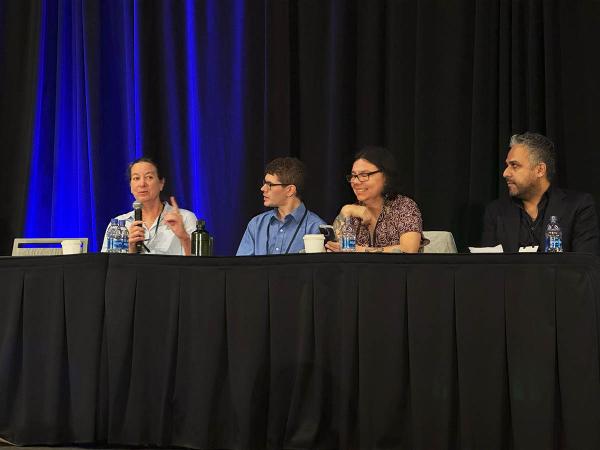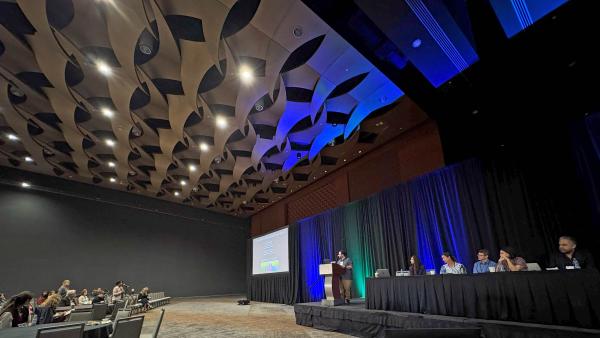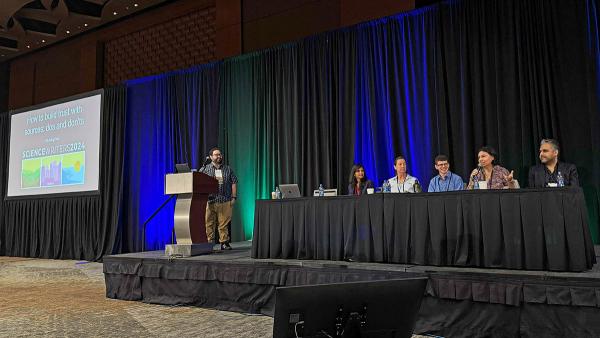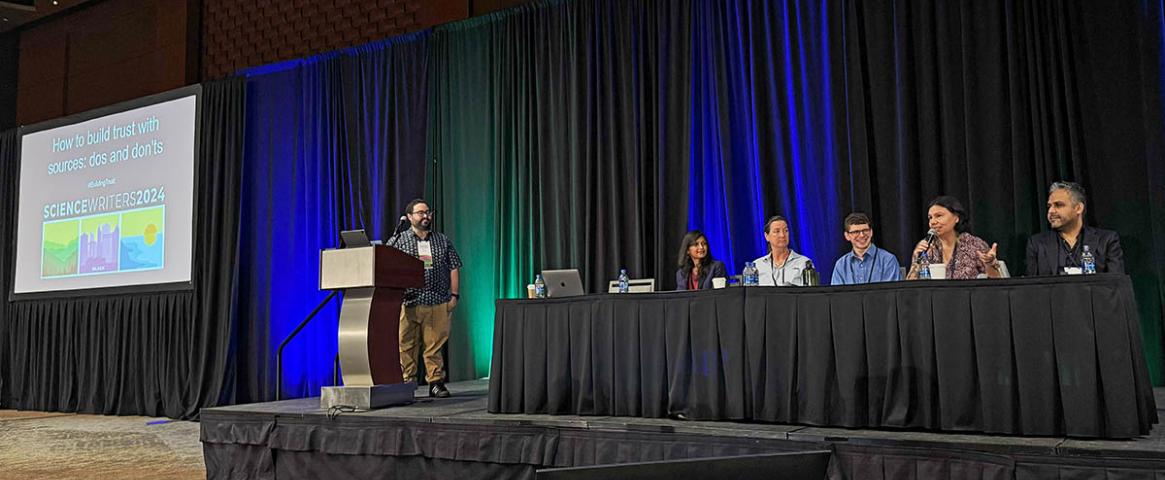Story by Rambo Talabong
There are many ways to build trust with sources. For some journalists, it means spending hours listening to a source’s story without rushing or interrupting. For others, it requires researching cultural sensitivities or clearly communicating the scope of a story. Regardless of the approach to getting it, trust is the cornerstone of impactful reporting.
This was the topic explored by an expert panel that included Pulitzer-winning journalist Martha Mendoza, STAT reporter Eric Boodman, IndigiNews publisher Eden Fineday, and former MIT researcher and whistleblower Babak Babakinejad. The "How to Build Trust with Sources — Dos and Don'ts" NASW plenary session at ScienceWriters2024 was organized by Rodrigo Pérez Ortega and Priyanka Runwal, and moderated by Runwal.
Drawing on their own experiences, they shared actionable tips and hard-earned lessons about building trust with sources.

SciWri24 attendees get seated for the "How to Build Trust with Sources" NASW plenary in Raleigh. (Ben Young Landis/NASW)
1. Listen. Listen. Listen.
Martha Mendoza, a Pulitzer-winning journalist with the Associated Press, underscored that listening is journalism’s most vital tool. “Listening is our key superpower,” she said. Taking time to truly hear what a source is saying — without interrupting — creates an environment of trust and mutual respect.
Mendoza shared about her experience speaking with elderly veterans who had kept their stories of atrocities in the Korean War buried for decades. Mendoza said listening attentively and asking them gently about their past allowed them to open up and share their experiences, which they have not even told their families.
2. Do Your Homework
Mendoza and Eden Fineday both stressed the importance of preparation. Doing your homework shows respect and builds trust, Fineday said, especially with Indigenous communities.
“Find out what language they speak. Find out in that language they have a name for themselves,” she said. She warned against asking “questions Google could answer.”
This effort also ensures cultural sensitivity. Fineday encouraged journalists to learn about historical events like forced relocations or residential schools before engaging with Indigenous sources.
Mendoza shared her use of scripts to guide sensitive interviews. These scripts reassure sources about the process and allow them to set boundaries. In her script, Mendoza reminds the source that it is their story to tell and that they can pause or stop the interview whenever they want.

Martha Mendoza speaks on the panel during the "How to Build Trust with Sources" NASW plenary at ScienceWriters2024. (Ben Young Landis/NASW)
3. Be Mindful of the Culture
Fineday brought attention to the unique challenges of reporting on Indigenous communities, where trust often hinges on cultural awareness. She encouraged journalists to reflect on their role in a story.
“Ask yourself: Is this my story to tell? Am I the right person for this?” she said. Such self-awareness ensures responsible reporting.
She advised non-Indigenous reporters to collaborate with journalists from the community they’re covering. Sharing bylines or giving credit to collaborators also helps to combat exploitative reporting practices.
4. Be transparent about the journalistic process
Babak Babakinejad emphasized transparency as a cornerstone of trust-building. Babakinejad represented the source’s perspective on the panel, as someone who must assess the intentions of journalists who approach him.
“I want to know what’s happening behind the scenes,” he said, explaining that sources need clarity about how their information will be used.
Mendoza added that setting realistic expectations is crucial.
“It's really important to let people know what I can and cannot control over the story and what you can and cannot control over the story. Because a lot of times people will say, I want you to report X, Y, and Z,” Mendoza said. “And I’m like, ‘I’m going to do my best.’”

Audience members line up during the Q&A portion of the "How to Build Trust with Sources" NASW plenary in Raleigh. (Ben Young Landis/NASW)
5. Give it time
All panelists agreed on the importance of time in building trust.
“Everyone wants to get the scoop. I don't think that's a very helpful aspect of the [journalism] culture. Here's what I would say: Someone else might get it out first, but I bet your story will be better. Because if you go deeper, how could it not be better?” said Fineday.
Boodman added that time is also needed to create the right mental space for interviews.
“Coming in harried or stressed doesn’t work,” he said. A calm, focused approach is essential for sensitive conversations.
6. Keep your promises
For sources like Babakinejad, trust is built on the journalist’s ability to keep their word.
He shared an example of a journalist promising to report more deeply on his story after an initial interview and then he finds that the journalist immediately published what they had spoken about two hours later.
He also advised against rushing sources because of the deadline, as he said that it made him “uncomfortable” when journalists try to make a deadline instead of making the story more accurate.
7. Check in with them
Mendoza shared how she maintains connections with past sources. “Sometimes, I’ll reach out a year after a story has been published just to check in,” she said. This ongoing engagement, she said, can foster trust and open doors for future reporting.
The panelists agreed that these relationships must be built on mutual respect and understanding, rather than transactional motives.
“Treat us as human beings before you treat us as a resource to extract from,” Fineday said, speaking for Indigenous sources.
“The whole thing is a human interaction. That feels like the center of what we’re doing here. If you're not acting like a human and you're not treating them like a human being, then what are we doing here?” said Boodman.

Panelists listen as Eden Fineday speaks during the Sunday NASW plenary session at ScienceWriters2024. (Ben Young Landis/NASW)
Rambo Talabong (www.rambotalabong.comis an award-winning journalist with a decade of experience covering politics, crime, and disasters. He led the unflinching coverage of the Duterte drug war by Nobel Prize-winning news site Rappler, where he exposed the systematic wrongdoing of policemen. Talabong has been honored with the Jaime V. Ongpin journalism prize, the Society of Publishers in Asia Awards, and the Human Rights Press Awards in Hong Kong, and has been a fellow at the Fellowships at Auschwitz for the Study of Professional Ethics.
This ScienceWriters2024 conference coverage article was produced as part of the NASW Conference Support Grant awarded to Talabong to attend the ScienceWriters2024 national conference. Find more 2024 conference coverage at www.nasw.org
A co-production of the National Association of Science Writers (NASW), the Council for the Advancement of Science Writing (CASW), and the Science Communicators of North Carolina (SCONC), the ScienceWriters2024 national conference featured an online portion Oct. 16-18, followed by an in-person portion held in Raleigh, N.C., Nov. 8-11. Follow the conversation via #SciWri24 on Bluesky and on LinkedIn.
Founded in 1934 with a mission to fight for the free flow of science news, NASW is an organization of ~2,400 professional journalists, authors, editors, producers, public information officers, students and people who write and produce material intended to inform the public about science, health, engineering, and technology. To learn more, visit www.nasw.org and follow NASW on LinkedIn and Bluesky. And join us in celebrating #NASW90th.
Credits: Reporting by Rambo Talabong; edited by Ben Young Landis.




